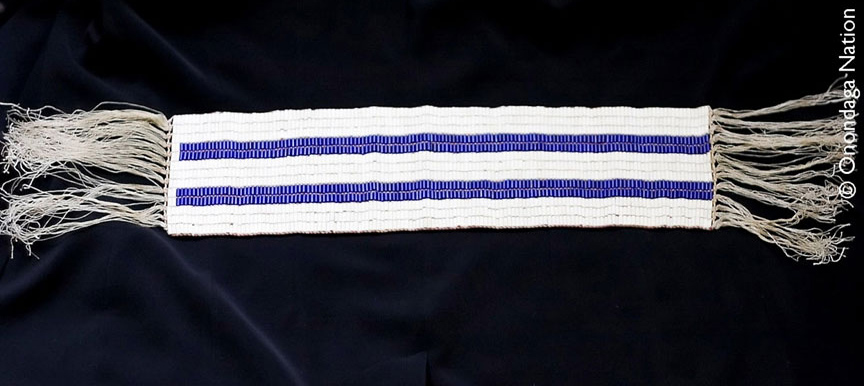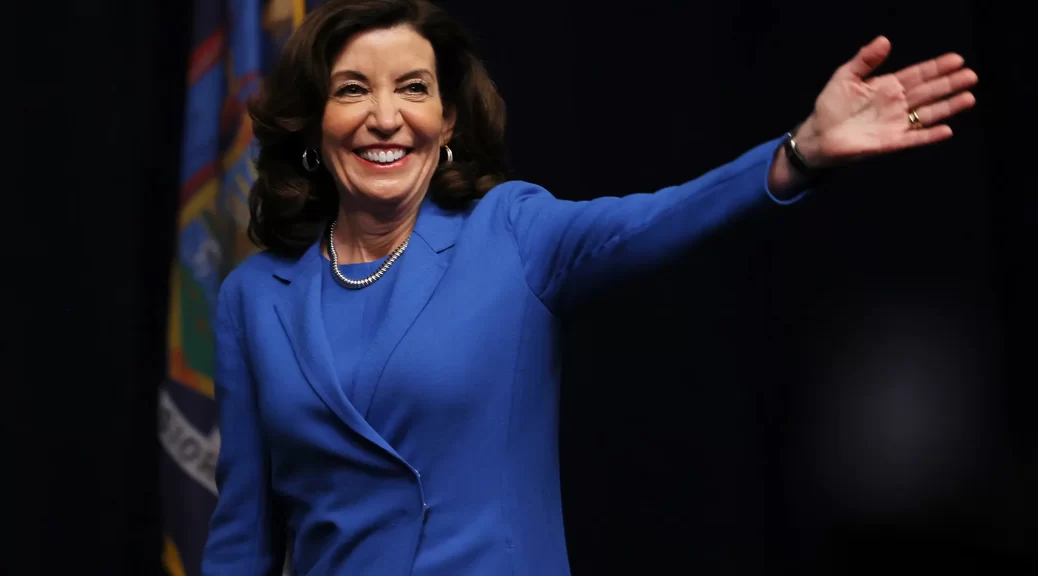Governor Kathy Hochul evidently believes that New York is able to lecture the state’s Indigenous peoples about the sanctity of contracts. She recently used the massive coercive power of the state to enforce an agreement that New York had first violated under her disgraced predecessor. It was a reprehensible display of raw power by the leader of a state government that has, from its inception, viewed the slightest trace of prosperity in Indian Country as a resource ripe for seizure and exploitation.
Governor Hochul recently froze the assets of the Seneca Nation of Indians, extorted from them a sum of several hundred million dollars, and proudly announced that those funds would cover the bulk of the state’s contribution to build a new football stadium for the Buffalo Bills. The Hochul family, because of her husband’s employment, stands to benefit enormously from the new stadium. She froze the Seneca Nation’s accounts because, in her view, they had not paid what they owed to the state and to several counties surrounding Seneca gaming enterprises in western New York. What neither she nor her supporters told you was that the Seneca Nation started withholding its payments when New York State violated its federally required compact with the Nation by allowing a competing gaming operation within the Senecas’ “exclusivity” zone.
I love the Buffalo Bills, but this stinks to high hell.
Let’s be clear. Neither the state nor the federal governments “gave” the Senecas the right to engage in casino gaming. According to the Supreme Court, gaming is a right encompassed within the inherent sovereignty of Native American Nations. What does that mean? Basically, under American law, Native American tribes can exercise any power they choose to exercise, so long as that power is not explicitly prohibited by a treaty or an act of congress, or implicitly prohibited by being somehow inconsistent with their status as “domestic dependent nations.” (Implicit divestiture is a murky concept, that has allowed a lot of state intrusion into the internal affairs of Native American Nations). Late in the 1980s, Congress passed a piece of legislation known as the Indian Gaming Regulatory Act, to set the ground rules for Indian gaming. For the most lucrative sorts of games—slots and the table games that most of us associate with casinos—Congress required that Indigenous nations enter a “compact” with the state in which they plan to do business. Many states extract a share of the casino revenue as one part of the agreement. In the Seneca Nation’s case, the state also guaranteed that the Senecas would have an exclusive right to operate gaming facilities in the western part of the state. When the state allowed competing enterprises to open, part of the Cuomo Administration’s ill-conceived plan to effectively tax people who are bad at math, the Senecas justly pointed out that the state violated the compact. Negotiations had been on-going up until the point when Governor Hochul realized she needed a ton of cash to support the Pegulas’ bid to build a new stadium for the Bills. As journalist David Kay Johnston pointed out, that agreement is a loser for taxpayers because the Pegulas easily could afford to construct the stadium themselves.
There is a long history here.
New York became the Empire State through a systematic program of Iroquois dispossession. That’s a fact. Though the Supreme Court declined to do anything about the process, arguing disingenuously that the injuries occurred too long ago to offer a workable remedy, most of the so-called treaties the state negotiated clearly violated federal law.
Not only were many of these transactions unambiguously illegal, but they were, as the kids say, as shady as hell. The Onondagas and Oneidas, for instance, entered into agreements in 1788 in which they were led to believe they would lease their lands to the State of New York. Turns out that when the treaty was written by New York officials, those leases had magically been transformed into sales. Dispossession through literacy in English. Other transactions took place with small
number of Indians present, few of whom were the proper people to sign treaties. And the United States, especially with regard to the Senecas, hardly kept its hands clean. The 1838 treaty of Buffalo Creek, a transaction designed to expel the Six Nations from New York State, is the most crooked treaty in the history of this country. That is saying something. Signatories were coerced or threatened, signatures were forged, and alcohol flowed freely. Meanwhile, both federal and state authorities in New York have ignored those provisions in treaties that protect Indigenous rights. For example, clauses guaranteeing the Senecas and their Iroquois neighbors the right to the “free use and enjoyment of their lands” in the 1794 Treaty of Canandaigua have been consistently ignored. They have ignored provisions in treaties guaranteeing Indigenous peoples the right to hunt and fish on the land they ceded to the state. The state has even tried to tax the “per capita” payments the Seneca Nation made to its members from the Nation’s gaming proceeds. It is just one assault after another. It is worth keeping in mind that the Seneca Nation has never asked for special privileges. It asked merely that the state of New York follow the rules to which it had agreed. Contracts are sacred, Governor Hochul suggested, unless they somehow limit her ability to funnel many millions of public dollars to private hands.
There is a principle that is very important to Iroquois people. The People who made up the Iroquois League conducted their lives in accordance

with this principle over the centuries. It is called “Guswenta,” and today it is represented by a very specific wampum belt known as the Two-Row, which depicted two parallel lines on a field of white. The lines represented the Iroquois and their non-native neighbors. They shared the same land, they occupied the same country, but they remained independent and autonomous. The lines did not cross, and neither natives nor newcomers should interfere in the affairs of the other. Indigenous peoples in this state have kept their part of the bargain. They have had little choice. The state, and its colonial predecessors, have not. The Indigenous people of this state have faced epidemic diseases, military invasions, the carrying away of their children to boarding schools, and systematic and deliberate attempts to wipe out their culture and take their land. Yet here they remain, developing their communities, looking forward, in a state that has been a steady and relentless adversary. They hoped the state would play by its own rules. Governor Hochul said no.
It is worth reading the statement from Seneca Nation president Matthew Pagels:
“New York’s hostile and shameless greed was laid bare for the world to see yesterday. After intentionally and unnecessarily holding the Seneca people and thousands of Western New Yorkers and families hostage for several days by strangling various bank accounts held by the Seneca Nation and our businesses, Governor Hochul couldn’t contain her excitement to boast about using her Seneca ransom money for a new stadium.
I’m sure that was welcome news to the Governor’s husband, whose company not only operates Video Lottery Terminals within the Seneca Nation’s supposed gaming exclusivity zone with the State’s blessing, but the company will also make millions of dollars in concession business inside the State-owned stadium. And it’s being paid for on the backs of the Seneca Nation. Quite a sweetheart deal.
We see, and we hope the world sees, the Governor’s announcement for what it is — the latest chapter in New York’s long history of mistreatment and taking advantage of Native people. Governor Hochul happily tried to strangle Western New York in order to squeeze every drop of blood she could get from the Seneca Nation.
It is not surprising to the Seneca Nation that the Governor thinks her actions should be applauded as progress. That’s the Albany way. The claims that a new day had dawned in Albany have turned into Groundhog Day — more of the same, just as it’s always been.
The Governor’s new stadium won’t be a product of progress. It will be a monument to Albany’s vindictive desire to punish the Seneca people. Ultimately, it’s something we’re all too familiar with.”
He’s right.


